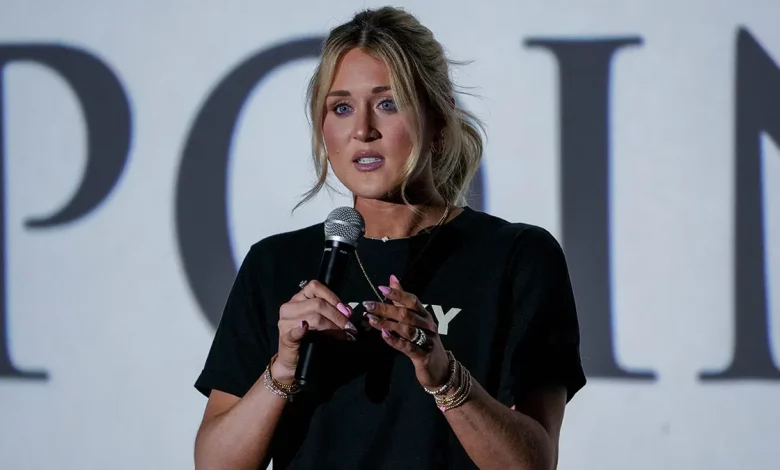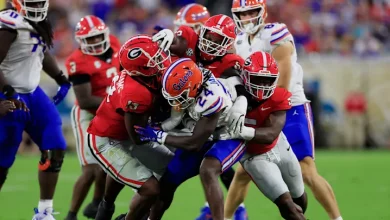Oklahoma softball coach Patty Gasso defended her players attending a Riley Gaines event, affirming their right to express their beliefs.

In the ever-evolving landscape of college athletics, the line between sports and social activism has become increasingly blurred. With athletes being given platforms to express their personal beliefs, coaches and administrators often find themselves navigating complex situations regarding the intersection of athletics, politics, and personal freedoms. For Oklahoma softball coach Patty Gasso, one such situation arose recently when several of her players attended an event featuring Riley Gaines, an outspoken advocate for women’s sports. Coach Gasso, known for her leadership and commitment to fostering a supportive and inclusive team environment, defended her players’ decision to attend the event, emphasizing their right to express their beliefs and make their own choices.
In the wake of this decision, questions arose about whether it was appropriate for college athletes to engage in political or social movements. Should a coach allow players to express their views freely, or should they remain neutral, particularly when such views may spark controversy? Patty Gasso’s defense of her players attending the Riley Gaines event offers an insightful lens into how athletes and coaches alike can balance personal freedoms, team unity, and the broader implications of their public actions.
The Context: Riley Gaines and the Debate Over Women’s Sports
To understand the significance of Patty Gasso’s defense of her players, it’s important to first consider the broader context surrounding Riley Gaines and her advocacy. Gaines, a former NCAA swimmer at the University of Kentucky, became a prominent figure in the debate over the inclusion of transgender women in women’s sports. As a competitive swimmer, Gaines had firsthand experience with the challenges of competing against transgender athletes who were assigned male at birth but transitioned to female. Her outspoken stance on the issue has sparked significant controversy, with Gaines arguing that allowing transgender women to compete in women’s sports is unfair to biological women.
Gaines’ views have led to her becoming a polarizing figure in the world of sports, as well as a leading voice in the conversation about the future of women’s athletics. For some, her advocacy aligns with the protection of women’s sports and the preservation of fair competition. For others, her views are seen as exclusionary, and they argue that such perspectives contribute to discrimination against transgender individuals. The event that several Oklahoma softball players attended was part of Gaines’ campaign to raise awareness about these issues.
As public figures, athletes often find themselves at the center of controversies like this, and their actions—both on and off the field—are scrutinized by fans, media, and other stakeholders. In this case, several players from the Oklahoma softball team chose to attend a rally where Riley Gaines was speaking. Their decision to attend the event was met with mixed reactions. Some applauded the athletes for using their platform to support a cause they believed in, while others criticized the choice, claiming that it was inappropriate for athletes to engage in such divisive issues.
Coach Patty Gasso’s Defense of Her Players
Patty Gasso, who has led the Oklahoma softball program to multiple NCAA championships and is widely regarded as one of the most successful coaches in collegiate athletics, defended her players’ decision to attend the event. Her comments reflected her strong belief in the importance of allowing her players to express their personal views and exercise their rights as individuals.
“I fully support our players and their decision to attend the Riley Gaines event,” Gasso stated. “As student-athletes, they are entitled to express their opinions and participate in causes they feel passionate about. It is crucial for them to learn how to balance their athletic commitments with their personal beliefs. Our program fosters an environment where open dialogue and respect for differing viewpoints are essential, and this is no exception.”
Gasso’s defense of her players underscores her commitment to supporting them as whole individuals, not just as athletes. While Gasso’s role as a coach is to develop players’ skills on the field, she also views her responsibility as a mentor who helps her players grow both personally and professionally. In today’s age of social media and amplified voices, it’s no longer sufficient for athletes to focus solely on their sport. Their personal beliefs and actions outside of competition often influence how they are perceived by the public and their teammates.
By defending her players, Gasso also emphasized the importance of standing up for what one believes in, even if those beliefs may be controversial. It’s a reminder that athletes, like everyone else, have the right to speak out on issues that matter to them. This is especially important in an era where social justice movements are gaining momentum and athletes are increasingly using their platforms to advocate for change.
The Role of Coaches in Supporting Athletes’ Freedom of Expression
Gasso’s decision to support her players raises an important question: What is the role of a coach in helping athletes navigate their personal beliefs in a public sphere? College athletes, particularly those at high-profile programs like Oklahoma, are often in the public eye, and their actions are scrutinized by fans, media, and even their own institutions. For many coaches, there may be pressure to keep their teams and athletes away from controversial political issues to avoid alienating fans or donors.
However, Patty Gasso’s approach to this situation is rooted in her long-standing philosophy of empowering her players to be true to themselves. She recognizes that college athletes are more than just athletes; they are young adults who are developing their own identities and opinions about the world around them. In Gasso’s view, the role of a coach is not just to teach the game but also to guide athletes through the complexities of being a public figure and to help them make informed decisions about the causes they choose to support.
“I believe that part of my job as a coach is to help my players develop into well-rounded individuals who are capable of thinking critically about the world,” Gasso continued. “We’re not just focused on winning games; we’re focused on shaping young women who will be leaders in their communities. If they feel strongly about something, I want them to be able to express themselves and advocate for what they believe in. That’s part of growing up.”
The Significance of Freedom of Expression in College Sports
In a society that often expects athletes to remain neutral or stay within the confines of their sport, the ability to speak out on important social issues is a powerful tool. For many athletes, their status as public figures provides them with a platform to amplify their voices and advocate for change. Whether they are speaking out on racial justice, gender equality, or other causes, their influence can be far-reaching.
In the case of the Oklahoma softball players attending the Riley Gaines event, their decision to publicly support Gaines’ views represents a personal choice—one that reflects their commitment to protecting women’s sports. While the subject is highly contentious and has drawn significant debate, it also speaks to the broader conversation about the intersection of athletics and activism.
Athletes today are no longer confined to the sidelines when it comes to societal issues. They are taking more active roles in shaping the narratives that surround them, and coaches like Gasso recognize the importance of allowing their players to make their own decisions. In defending her players, Gasso made it clear that her program values the freedom of expression and the opportunity for athletes to stand up for what they believe in, regardless of the potential backlash they may face.
The Importance of Supportive Team Environments
Patty Gasso’s defense of her players also underscores the importance of creating a supportive and inclusive team environment. While athletes may have differing views on controversial issues, Gasso believes it is crucial for her team to respect one another’s opinions. This attitude of mutual respect allows players to engage in constructive conversations and learn from each other, even if they don’t always agree.
“I want our team to be a place where we can have open and respectful conversations about different issues,” Gasso explained. “It’s important for our players to understand that just because someone holds a different opinion, it doesn’t mean they should be vilified. The key is respect, and that’s something we work on every day in our program.”
By fostering an environment where open dialogue is encouraged, Gasso is preparing her players not only for success in the sport but for the real-world challenges they will face beyond their athletic careers. Life isn’t always black and white, and learning how to navigate differences of opinion is a critical skill. For Gasso, it’s not about dictating what players should believe but about providing them with the tools they need to think critically and make decisions that align with their values.









